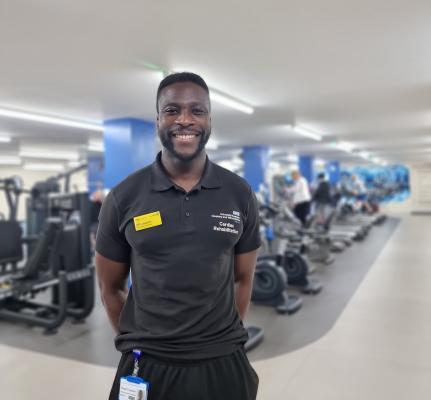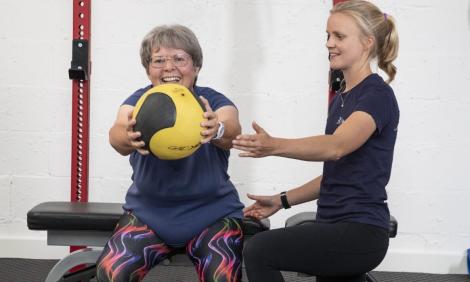Clinical exercise physiologist
Clinical exercise physiologists are responsible for prescribing and delivering evidence-based exercise to help patients prevent, treat and manage their long-term conditions.
Life as a clinical exercise physiologist
You'll work with people of all ages with a range of conditions, during what can be a distressing time in their lives.
You’ll carry out a range of tasks to assess a patient’s condition:
- cardiopulmonary exercise testing and other functional capacity tests, such as six-minute walk test
- muscular strength and fitness testing
- taking measurements of the human body
- electrocardiogram (ECG)
- resting and exercise blood pressure
- respiratory function tests
You’ll prescribe and deliver a range of exercise programmes tailored to the patient’s needs, which could include a combination of strength, cardiovascular, flexibility and balance exercises and training. You’ll also provide evidence-based education and advice to help people change negative behaviours affecting their well-being. This could include long-term exercise and physical activity programmes.
You’re likely to work in a team including doctors, specialist nurses, physiotherapists, and other healthcare science staff specialising in cardiac sciences and respiratory physiology. You may also work with patients in a range of settings:
- oncology with patients with different types of cancer and at different stages of treatment
- cardiology with patients with heart disease, high blood pressure and following a heart transplant
- respiratory with patients with conditions such as asthma, chronic obstructive pulmonary disease and cystic fibrosis
- frailty with patients with conditions such as osteoporosis, a history of falls and a fear of falling
- renal care with patients with conditions such as chronic kidney disease
- mental health with patients with conditions such as anxiety, stress and psychotic disorders
- metabolic with patients with conditions such as obesity, diabetes including gestational diabetes
- musculoskeletal with patients with conditions such as rheumatoid arthritis, osteoporosis, musculoskeletal pain/injuries and disabilities
- neurological/neuromuscular with patients with conditions such as stroke, dementia, Parkinson’s disease and multiple sclerosis
Oli Fiassam
Clinical exercise physiologist
Read Oli's storyI have always been passionate about helping people with their health and fitness.

How much can I earn?
If you’re employed by the NHS, you’ll be on a national pay and conditions system called Agenda for Change (AfC).
There are nine pay bands and as a clinical exercise physiologist registered with the Academy of Healthcare Science, you’ll usually be paid at band 6, with opportunities to progress with experience and further qualifications.
There are also trainee and assistant positions at band 4 and band 5 that with further training can lead to registered clinical exercise physiology status.
Terms and conditions of service can vary if you are employed outside the NHS.
How about the benefits?
As a clinical exercise physiologist in the NHS you'll:
- make a real difference to people’s lives, while pursuing a worthwhile, rewarding, and varied career
- have real opportunities for career development to advanced practice
- work with exciting new technology
- work flexibly with opportunities for part-time hours
- have access to an excellent pension scheme within the NHS
- enjoy NHS discounts in shops, restaurants and online
Must-have skills
You'll need a range of skills to be a clinical exercise physiologist, including:
- an interest in exercise and fitness and improving the health and wellbeing of people with long-term conditions
- interest in the pathophysiology of disease
- excellent interpersonal and communication skills
- calm, confident and sympathetic approach
- comfortable using modern technology and complex equipment
- ability to work both under direction and independently
- great attention to detail
- ability to work as part of a team
If you work in a role with responsibility for resources, such as staff, budgets or equipment, you’ll need excellent leadership skills and be able to use your initiative within the remit of your job role.
Entry Requirements
You’ll need a first degree in a relevant subject to do an exercise physiology master's degree, for example sport and exercise science, a science subject or another related discipline.
Experience of working in a relevant environment before applying for a place on a clinical exercise physiology master’s course could be an advantage. You should check with the course provider/employer to see what sort of experience they require.
How to become a clinical exercise physiologist
You’ll need to do a one-year master's degree in clinical exercise physiology.
If the course is accredited by the Academy of Healthcare Science (AHCS), you can apply to join the AHCS voluntary register once you have graduated. The AHCS also offers an equivalence route to registration which is open to those with suitable experience.
What are my chances of starting a career as an exercise physiologist?
Latest figures show that there are over 890 clinical exercise services in the UK. This is expected to increase with the development of the clinical exercise physiologist role delivering services for a wider range of clinical conditions.
It’s an exciting time to be working in an emerging and constantly evolving field.
Where a career as a clinical exercise physiologist can take you
With further training and/or experience, you can progress your career and apply for vacancies in specialist areas, management, research, or teaching at a higher banding.
You’ll be at the forefront of research and innovation ensuring patients are continually receiving the very best healthcare. In clinical exercise physiology, you’ll be continually developing new guidelines and protocols in line with emerging research.
You could also consider becoming a registered clinical scientist in one of the physiological sciences by applying to the NHS Scientist Training Programme.
-
For further information about careers in clinical exercise physiology, please visit:





